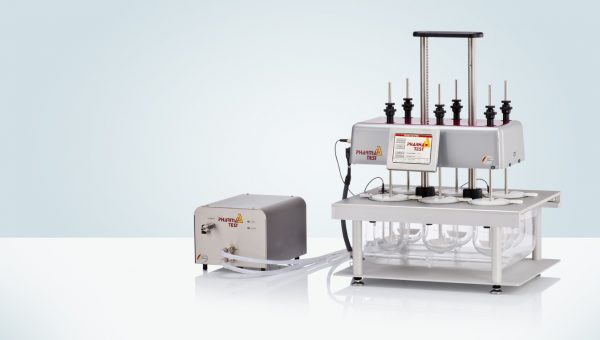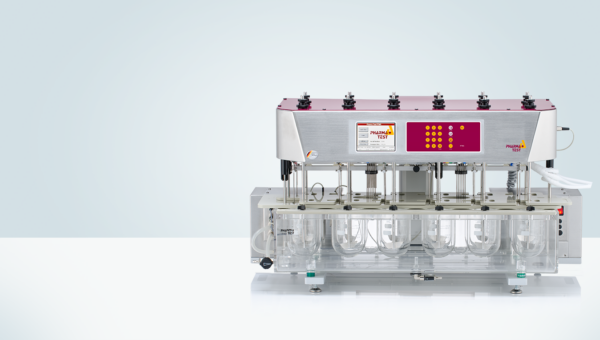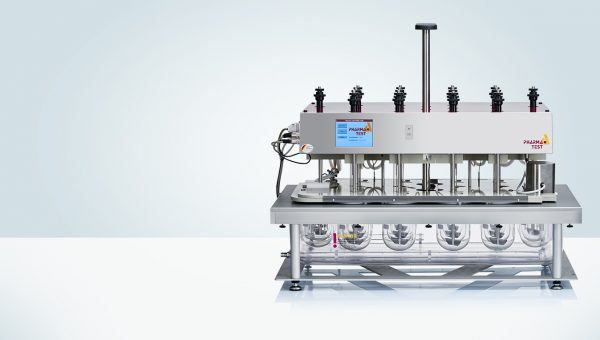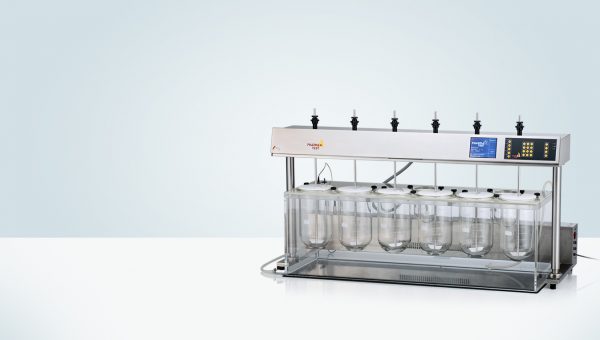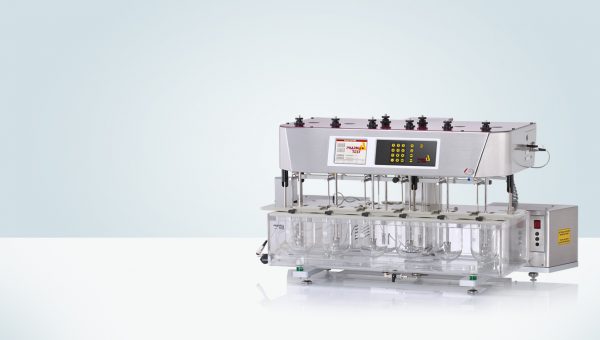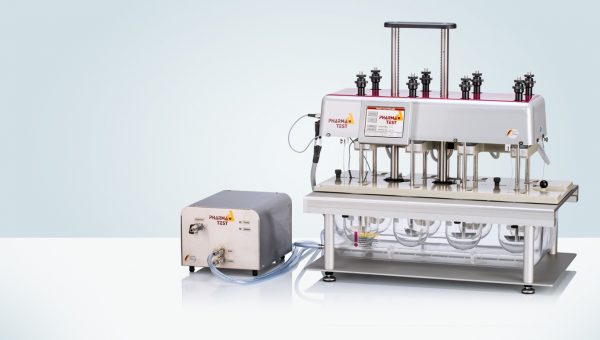PT-DR
Dispersion Releaser – Release Apparatus for Nano- and Microformulations
PT-DR
Dispersion Releaser – Release Apparatus for Nano- and Microformulations
The Dispersion Releaser PT-DR is a dialysis-based apparatus for the release testing of nanomedicines, microformulations and semi-solid dosage forms within a standard dissolution tester. It is composed of a sample holder cell serving as the donor compartment for dispersed dosage forms. A dialysis membrane is disposed around this housing. This donor chamber is agitated by a paddle stirrer that is connected to the USP Apparatus 2.
Application of the Dispersion Releaser
The Dispersion Releaser is connected to the dissolution tester by a special coupling directly affiliated to the stirrer shaft. This way the Dispersion Releaser can be hooked to the coupling and as well easily removed from the stirrer shaft for preparation and cleaning purposes. This ensures a direct transfer of the stirring movements to the stirrer of the Dispersion Releaser.
Basically the Dispersion Releaser consists of a donor and acceptor compartment. The donor compartment is a cylindrically construction which contains the substance to be tested. This construction is surrounded by a membrane, fixed through two O-rings, which acts as barrier between donor and acceptor compartment.
In the inside of the donor compartment is a small paddle, with integrated magnets, directly influenced and controlled by the stirrer shaft of the dissolution tester. Through the integrated magnets an external magnetic stirrer, located at the bottom of the donor, is driven to mix the media in the acceptor compartment.
Transport of the API through the Membrane
The stirring movement inside the donor compartment during a test run promotes the diffusion of the drug substance from the inside to the outside. The media in the acceptor compartment will be mixed with the same speed in the donor compartment, through the additional stirring movement of the external stirrer, driven by the internal one through magnetic attraction. Therefore a homogeneous suspension from media and drug formulation arises.
The only moveable part in the Dispersion Releaser is the shaft which connects the internal (and external) stirrer with the dissolution testers stirrer shaft. This one is structurally separated from the remaining parts (integrated vessel cover connected with the donor compartment by fittings) via a sealing ring.
Last Steps to Initialize the Test
As soon as the donor compartment of the Dispersion Releaser is surrounded by a membrane and filled with the substance to be tested, the adaption can be hanged onto the coupling. In a last step the external stirrer has to be positioned and now the Dispersion Releaser can be driven down into the vessel via the automated lift function of the dissolution testers. It is possible to use the Dispersion Releaser in a standard vessel or in a MiniVessel.
The volume usable in the MiniVessel and standard vessel is limited by the upper border of the donor compartment, as a backmixing of the donor with the acceptor media has to be prevented. Additionally the whole membrane has to be covered with media for a reliable and consistant release testing.


Dispersion Releaser fitting into a MiniVessel configuration (left) and into a standard vessel configuration (right)
Features
- Providing a uniform, constant and reliable release of the active substance which leads to reproducible results
- Tube membranes with a width between 26-32 mm can be used
- Typical materials for membran are cellulose ester and regenerated cellulose
Advantages
- Reproducible release through the additional stirring movement in the donor compartment
- Increased throughput of the dialysis process
- Mixing inside the donor and the acceptor compartment for an optimal homogeneous suspension
Included in the Standard Scope of Supply
- PT-DR with mounting tool for the membrane (part. no. 318-5010)
Request for Quotation
Dispersion Releaser can be used with these dissolution testing instruments
Related Articles
-
Pharma Test and Fraunhofer IME Announce the Dispersion Releaser – a New Solid Testing Apparatus for Nano- and Microformulations
-
Join the Virtual Conference Explain My Research: Drug Delivery & Precision Medicine, 27-28 May 2020
-
40 Years of Pharma Test! (1979-2019)
-
Recap of ACHEMA 2018 in Frankfurt/Main, Germany
-
Impressions from analytica 2018 in Munich, Germany






